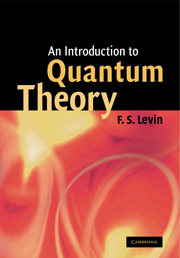Book contents
- Frontmatter
- Contents
- Preface
- PART I INTRODUCTORY
- Chapter 1 The Need for a Non-Classical Description of Microscopic Phenomena
- Chapter 2 Classical Concepts and Quantal Inequivalences
- Chapter 3 Introducing Quantum Mechanics: A Comparison of the Classical Stretched String and the Quantal Box
- Chapter 4 Mathematical Background
- PART II THE CENTRAL CONCEPTS
- PART III SYSTEMS WITH FEW DEGREES OF FREEDOM
- PART IV COMPLEX SYSTEMS
- Appendix A Elements of Probability Theory
- Appendix B Fourier Series and Integrals
- Appendix C Solution of Legendre's Equation
- Appendix D Fundamental and Derived Quantities: Conversion Factors
- References
- Index
Chapter 2 - Classical Concepts and Quantal Inequivalences
Published online by Cambridge University Press: 05 June 2012
- Frontmatter
- Contents
- Preface
- PART I INTRODUCTORY
- Chapter 1 The Need for a Non-Classical Description of Microscopic Phenomena
- Chapter 2 Classical Concepts and Quantal Inequivalences
- Chapter 3 Introducing Quantum Mechanics: A Comparison of the Classical Stretched String and the Quantal Box
- Chapter 4 Mathematical Background
- PART II THE CENTRAL CONCEPTS
- PART III SYSTEMS WITH FEW DEGREES OF FREEDOM
- PART IV COMPLEX SYSTEMS
- Appendix A Elements of Probability Theory
- Appendix B Fourier Series and Integrals
- Appendix C Solution of Legendre's Equation
- Appendix D Fundamental and Derived Quantities: Conversion Factors
- References
- Index
Summary
Chapter 1 was concerned with the need for a quantal description of microscopic phenomena. The thrust of Chapter 3 is an analysis and comparison of a classical and a quantum system; some mathematical generalizations of the analysis are presented as well. Chapter 4 provides an introduction to Hilbert-space concepts that are the mathematical framework of quantum theory, while, in Chapter 5, the axioms of quantum mechanics for pure states are stated and illustrated. The present chapter is intended to be a bridge between those chapters and Chapter 1. Here we review many of the concepts of classical mechanics that have relevance in quantum mechanics. Equally important, if not more so, we stress the lack of equivalence between a number of classical concepts and their quantal counterparts.
This inequivalence is emphasized because of the vocabulary common to classical and quantum mechanics. Classical physics is, of course, the source for much of the vocabulary in quantum physics. However, the ways in which the words are used in the two domains often differ substantially, while the concepts are almost necessarily not identical. Some classical concepts have no direct quantal counterparts. For example, velocity and force are not primary quantal entities. This fact means that the quantal definitions of linear and angular momentum cannot be the same as those in classical mechanics. Similarly, the concept of a “state” in classical physics – the collection of the generalized positions and generalized velocities or momenta – does not carry over to quantum physics.
- Type
- Chapter
- Information
- An Introduction to Quantum Theory , pp. 27 - 45Publisher: Cambridge University PressPrint publication year: 2001



